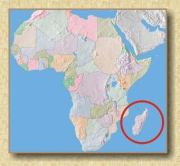When I’m tired of being the town spectacle with my white skin, I stay indoors and read. I’ve recently started reading the exhausting Lord of the Rings trilogy unaware that a real-life epic was taking place inside my home. This real-life epic involves termites.
One morning I walked out my front door and saw a squiggly groove in the sand leading from a palm tree to my patio. I kneeled to the groove and saw seventeen armies of termites carrying dirt into a crack in my porch and into my home. I took a can of bug spray, which was left behind by the last Peace Corps volunteer, and committed a war crime by gassing the termite armies with it. Then my neighbor and I laid termite powder around the cracks of my home.
A week later I awoke in the middle of the night with a stomach ache. The pain remained with me the whole day. I had no desire to eat and I vomited when I tried consuming a piece of cheese and bread. As I lay motionless in bed, I began thinking of all the things I consumed in the last day that could’ve caused my stomach ache: the soup and shish-kabobs at the hotely? the samosas on the street yesterday? the peanuts? the yogurt? my drinking water? Just for curiosity’s sake I unscrewed my water filter and look inside. About thirty termites were swimming in it. I looked to my left and discovered an army of termites eating away at my window shutter. They had successfully taken Pearl Harbor and were now giving the American leader heartburn.
The next day I bought a new can of insecticide and sprayed it into the cracks of the window shutter. To my horror thousands of termites poured out of the cracks and died. I then took a knife and scratched out every tiny mud tunnel the termites had made along my home’s walls.
For a week I thought I had conquered the looming shadows of evil. Then one afternoon I was taping a picture to the wall which I had received in the mail from my friend Carmen. As I rose the picture to the wall I found swarms of termites running from the ceiling to a crack in my wall and over to my shower. I took the insecticide and sprayed it in the ceiling and in the cracks of the wall. Millions of termites swarmed out of the ceiling and rained down dead to the floor. I had to move my furniture out from under the ceiling to spare them from the drops of entomological death above.
I hope this last episode is the climax of my epic. If it gets more exciting than millions of termites raining down dead to the floor, there will be orcs involved, and I’m not sure orcs and I can live under the same roof.



 Posted by Jordan Butler
Posted by Jordan Butler 


